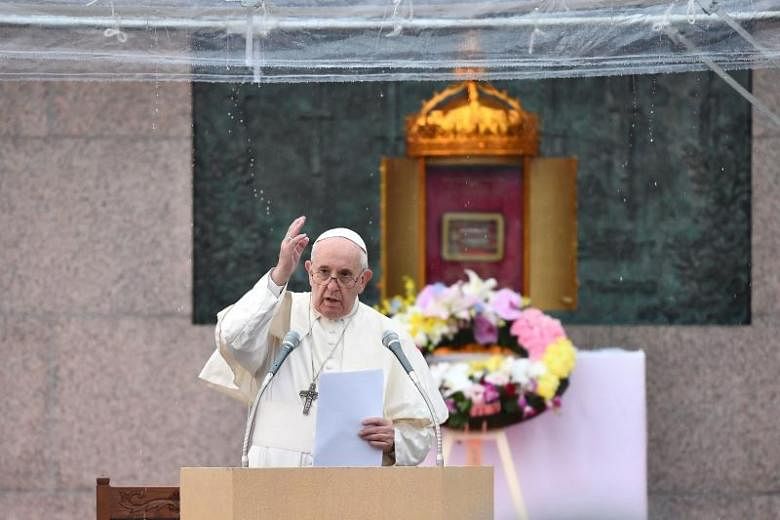NAGASAKI (AFP) - Pope Francis railed against the use of nuclear weapons and the growing arms trade on Sunday (Nov 24) as he paid tribute to the "unspeakable horror" suffered by victims of the Nagasaki atomic bomb.
In a highly symbolic visit to the Japanese city devastated by the nuclear attack in August 1945, Pope Francis said nuclear weapons were "not the answer" to a desire for security, peace and stability.
"Indeed, they seem always to thwart it," he said.
At least 74,000 people died from the atomic bomb unleashed on the city in western Japan - just three days after the world's first nuclear attack hit Hiroshima and killed at least 140,000.
"This place makes us deeply aware of the pain and horror that we human beings are capable of inflicting upon one another," said the sombre pontiff on the first full day of his Japan trip.
Hundreds of people in white waterproof garments sat in torrential rain to hear the Pope's speech, next to the emblematic photo of a young boy carrying his dead baby brother on his back in the aftermath of the attack.
He laid a wreath of white flowers and prayed silently in the rain.
Pope Francis took aim at what he called the "perverse dichotomy" of nuclear deterrence, saying that peace is incompatible with the "fear of mutual destruction or the threat of total annihilation".
This marked a break with past pontiffs - in a 1982 United Nations speech, Pope John Paul II described nuclear deterrence as a necessary evil.
The 82-year-old Francis also hit out at the "money that is squandered and the fortune made" in the arms trade, describing it as an "affront crying out to Heaven" in a world where "millions of children are living in inhumane conditions".
Later on Sunday, the Pope will visit Hiroshima and meet survivors of the atomic attack, known in Japanese as hibakusha, at the world-famous Peace Memorial in the city synonymous with the horror of nuclear war.
Mr Minoru Moriuchi, an 82-year-old Catholic survivor in Nagasaki, told AFP the Pope's visit would make the world "think seriously" about the nuclear issue as he described a "living hell" after the bomb was dropped.
"My father's sister ran away to our house with her two children and I never forgot this sight - their bodies were reddish-black and completely burnt," Mr Moriuchi said.
"Four other relatives were brought in... but they didn't look like humans."
'FONDNESS AND AFFECTION'
The Argentine pontiff is fulfilling a long-held ambition to preach in Japan - a country he wanted to visit as a young missionary.
"Ever since I was young, I have felt a fondness and affection for these lands," said Pope Francis when he arrived in Japan.
He landed in Nagasaki in the driving rain, greeted by two women in kimonos who handed him flowers before his motorcade splashed along the tarmac, security guards clutching umbrellas as they jogged alongside.
Like in Thailand, the first leg of his Asian tour, Catholicism is a minority religion in Japan.
Most people follow a mix of Shinto and Buddhism, with only an estimated 440,000 Catholics in the country.
Christians in Japan suffered centuries of repression, being tortured to recant their faith, and Pope Francis has paid tribute to the martyrs who died for their religion.
Alongside its nuclear history, Nagasaki is also a key city in Christian history, where the so-called "Hidden Christians" were discovered. These were people who had kept the faith alive in secret for 200 years while Japan was closed to the world.
In a later speech in Nagasaki, the Pope said that he as a "young Jesuit from the ends of the earth" had found "powerful inspiration in the story of the early missionaries and the Japanese martyrs".
Pope Francis returns to Tokyo on Sunday night, where he will, on Monday, meet victims of Japan's "triple disaster" - the 2011 earthquake, tsunami and nuclear meltdown.
He is also scheduled to deliver a mass at a Tokyo baseball stadium, meet Japan's new Emperor Naruhito and hold talks with Japanese government officials and local Catholic leaders.
On the first stop of his tour in Thailand, he preached a message of religious tolerance, meeting the country's King Maha Vajiralongkorn and the Supreme Patriarch who leads Thailand's Buddhists.

